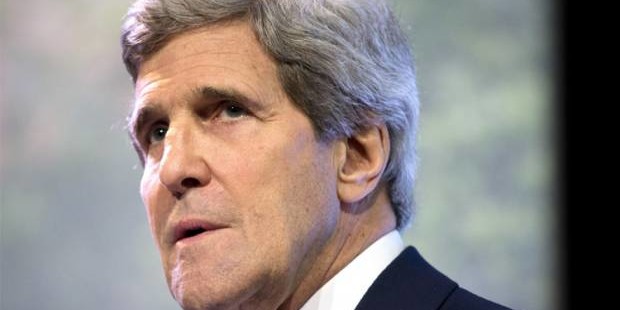
John Kerry’s policy of surrender: His failures are redefining American exceptionalism
Perhaps the secretary of state knows what he is doing: His many failures actually point to a smarter foreign policy
We have just marked a year since John Kerry launched himself, at 69, as America’s chief diplomat. And for most of the period since it has been difficult to find anything good to say about our 68th secretary of state.
Events of late require that I confess to error and change my mind. Kerry could go down as the most important overseer of American foreign policy in the post–Cold War era.
The record is very mixed, it is important to add immediately. The past year’s agenda is littered with failures — Syria (Kerry’s diplomacy just reached a dead end), the famous “pivot to Asia” (driftwood floating somewhere in the Pacific), Ukraine (Putin again trumps Washington). But this list goes straight to the point: Kerry appears to be managing America’s relations abroad at precisely the moment it comes clear that Washington must surrender the preeminence it has exploited without much inhibition since the Spanish-American War in 1898.
So in failure there lies buried a certain success. Each time Kerry encounters the limits of American power, he goes some way to redefining America’s place on the planet in what we can call our post–exceptionalist era. Of necessity this comes to a more modest but more constructive, less imposing and less disruptive presence. In failure success, and in retreat (as conservative critics, empire builders and militarists see it) we find advances.
There is one question that crystallizes the thought more than any other. Let us look closely.
Kerry’s efforts to restart talks between Israel and Palestinians — some Palestinians — are tritely advertised as his “signature” issue. Many were the commentators who warned that Kerry would break his pick trying to induce a settlement, and they are proven right. Talks continue, but it is evident now they are a wash.
Yet it is in Israel that Kerry has achieved his clearest success-that-looks-like-failure. He has brought light and air to a relationship that has been cloistered, untouchable, mired and on autopilot for decades. He has opened a door, then: Across the threshold, America will be better off, Israel will be better off, Palestinians will be better off, and the Middle East will be, too.
One can identify the very moment Kerry managed this feat. It was on the morning of Nov. 7 last year. That Thursday Kerry took the odd step of granting a joint interview to Channel 2, an Israeli network, and the Palestinian Broadcasting Corp., which, as the name implies, functions as a BBC of the occupied territories.
Putting the two correspondents together was inspired. In hindsight it suggested what was coming. The Israeli press thought he “spoke from the heart” and that he put aside his “statesman-like impartiality.” I do not think he did either. His remarks were considered, as is plain on reading them, and spotlessly impartial. What he dropped was the pretense of American impartiality that long ago devolved into a mere formality, an empty convention it was not done to acknowledge as such.
It is difficult to choose a single remark that represents the whole of what Kerry said. But here is a try. He was addressing a certain complacence evident in Israel of late, the thought that Israelis are safe as things are and in no need of a settlement with Palestinians.
“Well, I’ve got news for you,” Kerry said then. “Today’s status quo will not be tomorrow’s or next year’s. Because if we don’t resolve this issue, the Arab world, the Palestinians, neighbors, others, are going to begin again to push in a different way.”
The background here is important. Kerry was in Jerusalem for talks with Benjamin Netanyahu. The previous day the Israeli prime minister had prevailed upon Kerry to “steer [the Palestinians] back to a place where we could achieve the historical peace that we seek.” Netanyahu, as has been his habit since this round of talks began last July, had just announced that permits would be granted for yet more settlement construction on the West Bank.
Equally, momentum was building — notably but not only in Europe — behind boycotts of Israeli businesses operating on the West Bank, banks financing illegal settlements, and so on. This is called the BDS movement — boycotts, disinvestment and sanctions — and it starts to resemble the campaigns waged against South Africa during the later years of apartheid: a slow burn, but not without effect.
Kerry thus warned of a “third intifada,” this one an economic squeeze. “If we do not resolve the issues between Palestinians and Israelis,” he said early in the interview, “if we do not find a way to find peace, there will be an increasing isolation of Israel and an increasing campaign of de-legitimization of Israel.”
Kerry gathered steam as the encounter went on — almost certainly out of frustration, as Israeli commentators speculated. He let rip on the settlements question, the Israeli military presence, the risk of engendering a generation of Palestinians prone to what used to be called armed struggle.
Here are two more snippets:
“How, if you say you’re working for peace and you want peace, and a Palestine that is a whole Palestine that belongs to the people who live there, how can you say we’re planning to build in a place that will eventually be Palestine? So it sends a message that perhaps you’re not really serious.”

